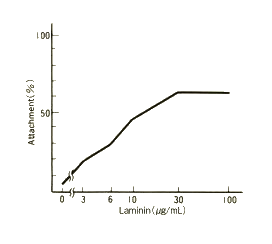Laminins are a major basement membrane component of most animal tissues. . In cell culture, laminins have been used for coating the surfaces of cell culture vessels. It is widely known that laminin-coated surfaces enhanced attachment to certain types of cells (primarily epithelial cells, neurons, hepatocytes, and muscle cells).
Overview
- Concentration: 0.5 mg/ml (the value obtained with the first lot)
- Formulation: 50 mM Tris-HCl (pH 7.4), 150 mM NaCl.
- Sterility: Filtered through a 0.2 μm pore size membrane.
- Storage Conditions: Store at –80°C. (Stable at –20ºC for one year.)
Product Validation

The laminin stock solution was diluted with D-PBS (calcium- and magnesium-free) to the concentrations indicated in the figure. Diluted laminin solutions were placed in 24-well plates (0.3 ml/well) and incubated overnight at 37℃. Following incubation, the laminin solutions were removed by aspiration and the wells were blocked with BSA. TIG-3 cells were then plated at a density of 5×104 cells/ml and were allowed to attach to the wells for 90 min at 37°C. Subsequently, unattached cells were removed by washing. The remaining adherent cells were harvested by treatment with trypsin-EDTA and used for cell number quantification.
